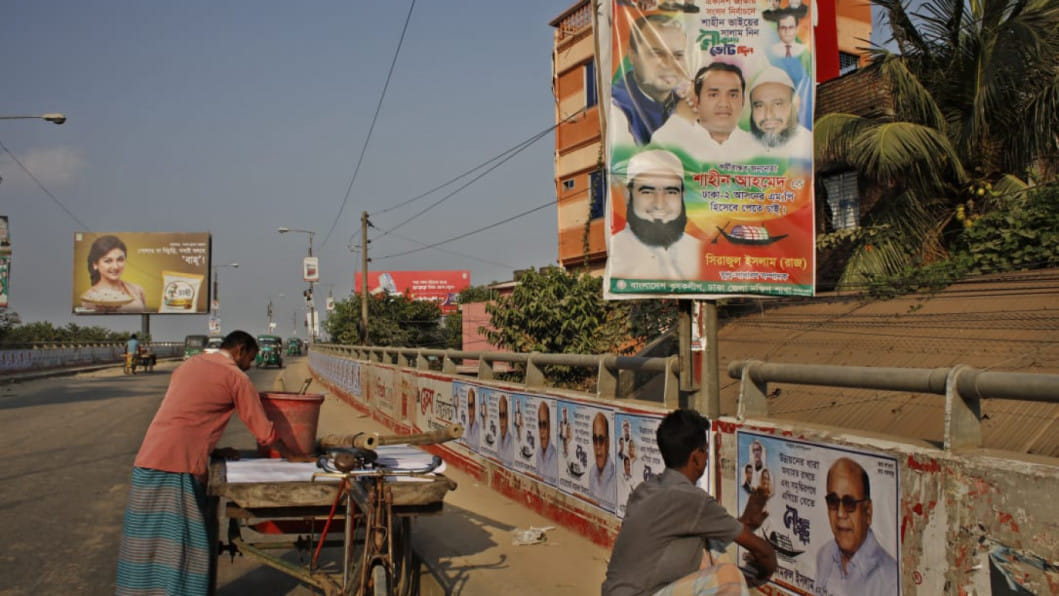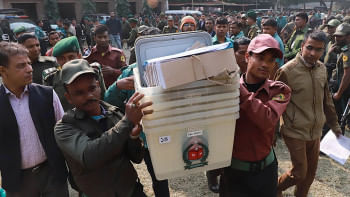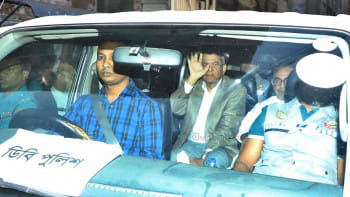The facade of a competitive election

Since 1991, Bangladesh has witnessed robust, genuine general elections till 2008, with the exception of the one in February 1996 which was overseen by the ruling government and boycotted by the main opposition of the time. Regardless of the veracity of those elections (1991, June 1996, 2001 and 2008), the losing parties labelled them as "unfair," claiming "minor irregularities," "blatant rigging," "election engineering," "ballot stuffing" or "voting at night." We also witnessed how 153 lawmakers were elected uncontested in the 2014 election, while in 2018, there were widespread allegations of ballot stuffing on the eve of the actual polls.
So, the nature of the impending election gives us a moment to ponder the present political scenario. The ruling Awami League is desperately trying to showcase the polls as inclusive and competitive—one that will lead to high voter turnout, although the main political opposition BNP and some left-wing and right-wing parties are boycotting the polls.
As the ruling party's main challenge is to make the election look inclusive, it has adopted a strategy of allowing and encouraging those within its ranks to run as "independent" candidates. But before the ruling party chief endorsed their "independence," these aspirants were known as "rebel" candidates, who run against candidates of their own party after having been spurned in the race for nomination.
These independents have now become a major concern for ruling party nominees. According to news reports, intra-party fights are now likely, meaning that the contest will mainly be limited to AL nominees and AL independents. However, whoever wins, it is basically a victory for the ruling party. The election will look competitive as both candidates will try to reach out to the voters, possibly leading to higher voter turnout, although how fierce the intra-party feud will be is yet to be seen. There will also be no walkover this time, meaning no string of candidates being elected unchallenged—like what happened in 2014.
Rights advocate Sultana Kamal has rightly stated that the election has become a staged performance. We know the opposition parties have been terming the election staged, but when it comes from a noted civil society member who is uncompromising on issues of liberation and human rights, that gives it more credence.
Obviously, it is a good move to make the election competitive, but this one may prove to be costly depending on how it plays out in the future.
Meanwhile, the ruling party's alliance partners seem more concerned. They held a series of meetings with AL to negotiate a settlement on the number of seats that might be conceded to them. According to reports, this is likely to be only seven—down from 16 in 2018—with Jatiya Party (Monju) getting one, and two leftist parties getting three each. All the alliance partners said they wanted to contest the election with the AL symbol like they did in the past.
This time, the ruling party announced candidates for 298 seats. So, it has to withdraw some of its candidates from the seats where its alliance partners will run. But this is not enough for the coalition partners. They want no independent candidate from the ruling party, which essentially means they want to be elected unchallenged. They want assurance of victory in the polls, because an endorsement from AL ensures that. This precludes any possibility of competition, which is the main essence of an election.
There is more. The main opposition in parliament, Jatiya Party, is also negotiating with the ruling party over seat-sharing. It also wants assurance of victory and a guarantee that there will be no independents in its constituencies. But AL has said there will be independents. It is surely a rare incident in Bangladesh politics when the opposition party is in discussion with the ruling party over election strategy. Jatiya Party saw itself broken into factions over election, and its manner of negotiations points to its utter lack of confidence in winning a competitive election.
So when the political situation is largely like this, the whole affair seems like a friendly charity match, in which it doesn't matter who wins. After all, it will either be AL's nominee or loyalist, or an "opposition" endorsed by AL itself. This proves that Awami League has become so strong that other parties exist merely on paper. Basically, those parties have degenerated into political clubs without any ideology, and the polls are merely a cosmetic exercise to exhibit—by dint of their presence on the ballot—that they do indeed exist. Their only intention is to land in parliament with the blessings and generosity of the ruling party.
The alliance partners and Jatiya Party have been in a favourable position for the last 15 years, enjoying their status and privileges. However, they have failed to strengthen their parties. Meanwhile, the ruling party has taken the election process to such a level where its victory is a certainty one way or the other.
While opposition parties used different labels to term previous elections, as stated before, this time it's different. Rights advocate Sultana Kamal has rightly stated that the election has become a staged performance. We know the opposition parties have been terming the election staged, but when it comes from a noted civil society member who is uncompromising on issues of liberation and human rights, that gives it more credence.
The most crucial point is that, previously, these questions were raised after the elections ended, but this time, they are being raised even before it is held. The way AL is managing contesting parties and the strategies it has adopted to make the election inclusive and competitive, this election is surely a cosmetic one through which the government will be able to claim that everything was perfect, at least, through the clinical lens of legitimacy. But it would fall desperately short in terms of the spirit and purpose of elections.
Mohammad Al-Masum Molla is chief reporter at The Daily Star.
Views expressed in this article are the author's own.
Follow The Daily Star Opinion on Facebook for the latest opinions, commentaries and analyses by experts and professionals. To contribute your article or letter to The Daily Star Opinion, see our guidelines for submission.

 For all latest news, follow The Daily Star's Google News channel.
For all latest news, follow The Daily Star's Google News channel. 









Comments